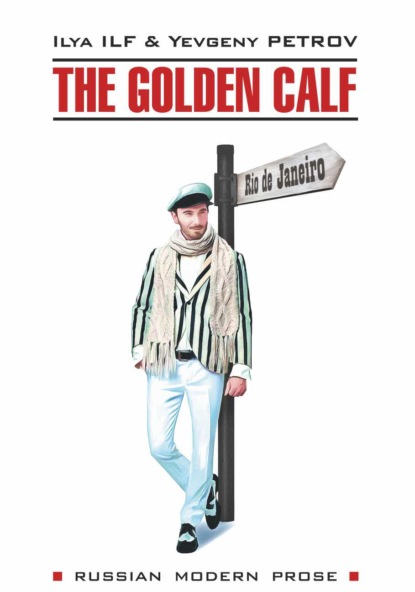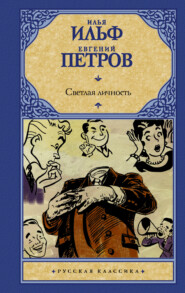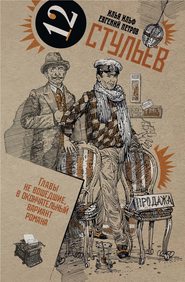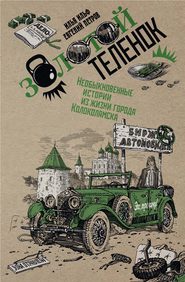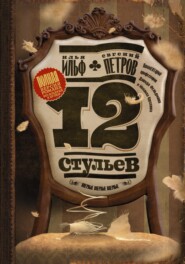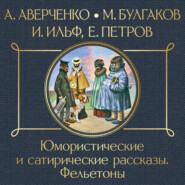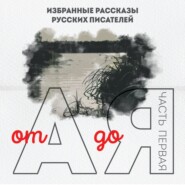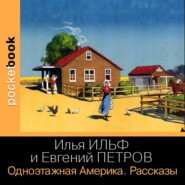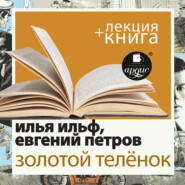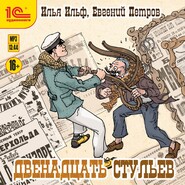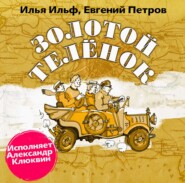По всем вопросам обращайтесь на: info@litportal.ru
(©) 2003-2024.
✖
Золотой теленок / The Golden Calf
Автор
Жанр
Серия
Год написания книги
1931
Теги
Настройки чтения
Размер шрифта
Высота строк
Поля
“The car is not a luxury but a means of transportation!”
With the exception of Ostap, all the Antelopeans were somewhat unnerved by this elaborate reception. Not knowing what to make of it, they fidgeted in the car like little sparrows in their nest. Panikovsky, who generally disliked large gatherings of honest people, crouched on the floor just in case, so that the villagers could see only the dirty top of his straw hat. Ostap, on the other hand, was totally unfazed. He took off his white-topped cap and acknowledged the greetings by nodding left and right with dignity.
“Improve the roads!” he shouted as a farewell. “Merci for the reception!”
The car was back on the white road cutting though a large, quiet field.
“They’re not going to chase us?” asked Panikovsky anxiously. “Why the crowd? What happened here?”
“These people have never seen an automobile before, that’s all,” said Balaganov.
“Continuing our discussion,” commented Ostap. “Let’s hear from the driver. What’s your assessment, Adam Kazimirovich?”
The driver thought for a moment, sounded the maxixe to shoo off a silly dog that had run into the road, and allowed that the crowd had gathered to celebrate a local church holiday. “Holidays of this nature are common among country people,” explained the driver of the Antelope.
“Right,” said Ostap. “Now I know for sure that I’m in the company of unenlightened people. In other words, bums without university education. Children, dear children of Lieutenant Schmidt, why don’t you read newspapers? One must read newspapers. They quite often sow the seeds of reason, good, and the everlasting.”
Ostap pulled a copy of Izvestiya out of his pocket and loudly read to the crew a short article about the Moscow – Kharkov – Moscow auto rally.
“We are now on the route of the rally,” he said smugly, “roughly one hundred miles ahead of its lead car. I suppose now you understand what I’m talking about?”
The low-ranking Antelopeans were quiet. Panikovsky unbuttoned his jacket and scratched his bare chest under his dirty silk tie.
“So you still don’t get it? Apparently, even reading newspapers doesn’t help in some cases. Fine, I’ll give you more details, even though it goes against my principles. First: the peasants thought the Antelope was the lead car of the rally. Second: we don’t deny it. Moreover, we will appeal to all organizations and persons for proper assistance, underscoring the fact that we are the lead car. Third… Oh well, the first two points should be enough for you. It’s abundantly clear that we will keep ahead of the rally for a while and will milk, skim off, and otherwise tap this highly civilized undertaking.”
The grand strategist’s speech made a huge impression. Kozlevich looked at the captain with admiration. Balaganov rubbed his wild red locks with his palms and laughed uncontrollably. Panikovsky shouted “Hooray!” in anticipation of worry-free looting.
“All right, enough emotion,” said Ostap. “On account of the falling darkness, I now declare the evening open. Stop!”
The car stopped, and the tired Antelopeans climbed out. Grasshoppers hopped around in the ripening crops. The passengers were already seated in a circle near the road, but the old Antelope was still huffing and puffing, its body creaking here and there and its engine rattling occasionally.
The novice Panikovsky made such a large fire that it seemed like a whole village was ablaze. The wheezing flames blew in all directions. While the travelers fought the pillar of fire, Panikovsky bent down and ran into the fields, returning with a warm, crooked cucumber in his hand. Ostap promptly snatched the cucumber from him, saying:
“Don’t make a cult out of eating.”
Then he ate the cucumber himself. They dined on the sausage that the practical Kozlevich brought from home and went to sleep under the stars.
“And now,” said Ostap to Kozlevich at sunrise, “get ready. Your mechanical tub has never seen a day like this before, and it will never see one like this again.”
Balaganov grabbed a small bucket, that was inscribed “Arbatov Maternity Hospital,” and ran to the river to fetch some water. Adam raised the hood of the car, squeezed his hands into the engine, and, whistling along, started fiddling with its little copper intestines. Panikovsky leaned against the spare wheel and stared pensively and unblinkingly at the cranberry-colored sliver of sun that had appeared above the horizon. The light revealed a multitude of small age-related details on his wrinkled face: bags, pulsating veins, and strawberry-colored splotches. This was the face of a man who had lived a long, honorable life, has adult children, drinks healthy acorn coffee in the morning, and writes for his organization’s newsletter under the pen name “The Antichrist.”
“Panikovsky,” asked Ostap suddenly, “do you want to hear how you’re going to die?”
The old man flinched and turned toward him.
“It’ll be like this. One day, when you return to a cold, empty room at the Hotel Marseilles – which will be in some small town where your line of work takes you – you’ll start feeling sick. One of your legs will be paralyzed. Hungry and unshaven, you will lie on a wooden bench, and nobody will come to see you, Panikovsky, nobody will feel sorry for you. You didn’t have kids because you were too cheap, and you dumped your wives. You will suffer for an entire week. Your agony will be horrible. Your death will be slow, and everyone will be sick and tired of it. You will not be quite dead yet when the bureaucrat in charge of the hotel will already be requesting a free coffin from the municipal authorities… What is your full name?”
“Mikhail Samuelevich,” replied the stunned Panikovsky.
“…requesting a free coffin for Citizen M. S. Panikovsky. But don’t cry, you’ll still last for a couple of years. Now back to business. We need to take care of the promotional and educational aspects of our campaign.”
Ostap pulled his doctor’s bag out of the car and put it down on the grass.
“My right hand,” said the grand strategist, patting the bag on its fat sausage-like side. “Everything that an elegant man of my age and ambition might possibly need is right here.”
Bender squatted over the bag like an itinerant Chinese magician and started pulling various objects out of it. First he took out a red armband with the word “Administrator” embroidered on it in gold. It was joined on the grass by a policeman’s cap with the crest of the city of Kiev, four decks of playing cards with identically patterned backs, and a pack of official documents with round purple stamps on them.
The entire crew of the Antelope looked at the bag with respect. Meanwhile, new objects kept coming out of it.
“You are amateurs,” said Ostap, “I’m sure you’d never understand why an honest Soviet pilgrim like me can’t get by without a doctor’s coat.”
The bag contained not only the coat but a stethoscope as well.
“I’m not a surgeon,” remarked Ostap. “I am a neuropathologist, a psychiatrist. I study the souls of my patients. For some reason, I always get very silly souls.”
An ABC for the deaf-and-dumb came out of the bag next, followed by charity postcards, enamel badges, and a poster, which featured Bender himself in traditional Indian pants and a turban. The poster read:
A PRIEST has ARRIVED!!!
the famous Bombay brahmin (yogi)
– son of Parva —
Iokanaan Of Murusidze
The poster was followed by a dirty, greasy turban.
“I resort to this kind of amusement very rarely,” said Ostap. “Believe it or not, it’s the progressive-minded people, like the directors of railway workers’ clubs, who are the most likely to buy into the high priest story. The job is easy but irksome. Personally, I find being the favorite of Rabindranath Tagore distasteful. And Samuel the Prophet invariably gets the same old questions: ‘Why is there no butter in the stores?’ or ‘Are you Jewish?’”
Ostap finally found what he was looking for – a lacquered tin with honey-based paints in porcelain cups and two paintbrushes.
“The car that leads the rally has to be decorated with at least one slogan,” said Ostap.
He then proceeded to paint brown block letters on a long band of yellowish linen: They hung the banner above the car on two long tree branches.
The moment the car started moving, the banner arched in the wind and looked so dashing that it left no doubt about the need to use the rally as a weapon against roadlessness, irresponsibility, and maybe even red tape as well. The passengers of the Antelope started puffing and preening. Balaganov covered his red hair with the cap that he always carried in his pocket. Panikovsky turned his cuffs inside out and made them show exactly three-quarters of an inch below the sleeves. Kozlevich was more concerned about the car than about himself. He washed it thoroughly before starting out, and the sun was glimmering on the Antelope’s dented sides. The captain squinted playfully and teased his companions.
“Village on the port side!” yelled Balaganov, making a visor with his hand. “Are we stopping?”
“We are followed by five top-notch vehicles,” said Ostap. “A rendezvous with them is not in our interest. We must skim off what we can, and fast. Therefore, we’ll stop in the town of Udoev. Incidentally, that’s where the drum of fuel should be waiting for us. Step on it, Adam.”
“Do we respond to the crowds?” asked Balaganov anxiously.
“You can respond with bows and smiles. Kindly keep your mouth shut; God knows what might come out of it.”
The village greeted the lead car warmly, but the usual hospitality had a rather peculiar flavor here. The citizens must have been informed that someone would be passing through, but they didn’t know who or why. So, just in case, they dug up all the slogans and mottoes from previous years. The street was lined with schoolchildren who were holding a hodgepodge of obsolete banners: “Greetings to the Time League and its founder, dear Comrade Kerzhentsev!” “The bourgeois threats will come to naught, we all reject the Curzon note!” “For our little ones’ welfare please organize a good daycare.” Besides that, there were many banners of various sizes, written primarily in Old Church Slavonic script, all saying the same thing: “Welcome!” All this flew swiftly by.
This time, the crew waved their hats with confidence. Panikovsky couldn’t resist and, despite his orders, jumped up and shouted a confused, politically inappropriate greeting. But nobody could make it out over the noise of the engine and the roar of the crowd.
“Hip, hip, hooray!” cried Ostap.
Kozlevich opened the choke, and the car emitted a trail of blue smoke – the dogs that were running after them started sneezing.
With the exception of Ostap, all the Antelopeans were somewhat unnerved by this elaborate reception. Not knowing what to make of it, they fidgeted in the car like little sparrows in their nest. Panikovsky, who generally disliked large gatherings of honest people, crouched on the floor just in case, so that the villagers could see only the dirty top of his straw hat. Ostap, on the other hand, was totally unfazed. He took off his white-topped cap and acknowledged the greetings by nodding left and right with dignity.
“Improve the roads!” he shouted as a farewell. “Merci for the reception!”
The car was back on the white road cutting though a large, quiet field.
“They’re not going to chase us?” asked Panikovsky anxiously. “Why the crowd? What happened here?”
“These people have never seen an automobile before, that’s all,” said Balaganov.
“Continuing our discussion,” commented Ostap. “Let’s hear from the driver. What’s your assessment, Adam Kazimirovich?”
The driver thought for a moment, sounded the maxixe to shoo off a silly dog that had run into the road, and allowed that the crowd had gathered to celebrate a local church holiday. “Holidays of this nature are common among country people,” explained the driver of the Antelope.
“Right,” said Ostap. “Now I know for sure that I’m in the company of unenlightened people. In other words, bums without university education. Children, dear children of Lieutenant Schmidt, why don’t you read newspapers? One must read newspapers. They quite often sow the seeds of reason, good, and the everlasting.”
Ostap pulled a copy of Izvestiya out of his pocket and loudly read to the crew a short article about the Moscow – Kharkov – Moscow auto rally.
“We are now on the route of the rally,” he said smugly, “roughly one hundred miles ahead of its lead car. I suppose now you understand what I’m talking about?”
The low-ranking Antelopeans were quiet. Panikovsky unbuttoned his jacket and scratched his bare chest under his dirty silk tie.
“So you still don’t get it? Apparently, even reading newspapers doesn’t help in some cases. Fine, I’ll give you more details, even though it goes against my principles. First: the peasants thought the Antelope was the lead car of the rally. Second: we don’t deny it. Moreover, we will appeal to all organizations and persons for proper assistance, underscoring the fact that we are the lead car. Third… Oh well, the first two points should be enough for you. It’s abundantly clear that we will keep ahead of the rally for a while and will milk, skim off, and otherwise tap this highly civilized undertaking.”
The grand strategist’s speech made a huge impression. Kozlevich looked at the captain with admiration. Balaganov rubbed his wild red locks with his palms and laughed uncontrollably. Panikovsky shouted “Hooray!” in anticipation of worry-free looting.
“All right, enough emotion,” said Ostap. “On account of the falling darkness, I now declare the evening open. Stop!”
The car stopped, and the tired Antelopeans climbed out. Grasshoppers hopped around in the ripening crops. The passengers were already seated in a circle near the road, but the old Antelope was still huffing and puffing, its body creaking here and there and its engine rattling occasionally.
The novice Panikovsky made such a large fire that it seemed like a whole village was ablaze. The wheezing flames blew in all directions. While the travelers fought the pillar of fire, Panikovsky bent down and ran into the fields, returning with a warm, crooked cucumber in his hand. Ostap promptly snatched the cucumber from him, saying:
“Don’t make a cult out of eating.”
Then he ate the cucumber himself. They dined on the sausage that the practical Kozlevich brought from home and went to sleep under the stars.
“And now,” said Ostap to Kozlevich at sunrise, “get ready. Your mechanical tub has never seen a day like this before, and it will never see one like this again.”
Balaganov grabbed a small bucket, that was inscribed “Arbatov Maternity Hospital,” and ran to the river to fetch some water. Adam raised the hood of the car, squeezed his hands into the engine, and, whistling along, started fiddling with its little copper intestines. Panikovsky leaned against the spare wheel and stared pensively and unblinkingly at the cranberry-colored sliver of sun that had appeared above the horizon. The light revealed a multitude of small age-related details on his wrinkled face: bags, pulsating veins, and strawberry-colored splotches. This was the face of a man who had lived a long, honorable life, has adult children, drinks healthy acorn coffee in the morning, and writes for his organization’s newsletter under the pen name “The Antichrist.”
“Panikovsky,” asked Ostap suddenly, “do you want to hear how you’re going to die?”
The old man flinched and turned toward him.
“It’ll be like this. One day, when you return to a cold, empty room at the Hotel Marseilles – which will be in some small town where your line of work takes you – you’ll start feeling sick. One of your legs will be paralyzed. Hungry and unshaven, you will lie on a wooden bench, and nobody will come to see you, Panikovsky, nobody will feel sorry for you. You didn’t have kids because you were too cheap, and you dumped your wives. You will suffer for an entire week. Your agony will be horrible. Your death will be slow, and everyone will be sick and tired of it. You will not be quite dead yet when the bureaucrat in charge of the hotel will already be requesting a free coffin from the municipal authorities… What is your full name?”
“Mikhail Samuelevich,” replied the stunned Panikovsky.
“…requesting a free coffin for Citizen M. S. Panikovsky. But don’t cry, you’ll still last for a couple of years. Now back to business. We need to take care of the promotional and educational aspects of our campaign.”
Ostap pulled his doctor’s bag out of the car and put it down on the grass.
“My right hand,” said the grand strategist, patting the bag on its fat sausage-like side. “Everything that an elegant man of my age and ambition might possibly need is right here.”
Bender squatted over the bag like an itinerant Chinese magician and started pulling various objects out of it. First he took out a red armband with the word “Administrator” embroidered on it in gold. It was joined on the grass by a policeman’s cap with the crest of the city of Kiev, four decks of playing cards with identically patterned backs, and a pack of official documents with round purple stamps on them.
The entire crew of the Antelope looked at the bag with respect. Meanwhile, new objects kept coming out of it.
“You are amateurs,” said Ostap, “I’m sure you’d never understand why an honest Soviet pilgrim like me can’t get by without a doctor’s coat.”
The bag contained not only the coat but a stethoscope as well.
“I’m not a surgeon,” remarked Ostap. “I am a neuropathologist, a psychiatrist. I study the souls of my patients. For some reason, I always get very silly souls.”
An ABC for the deaf-and-dumb came out of the bag next, followed by charity postcards, enamel badges, and a poster, which featured Bender himself in traditional Indian pants and a turban. The poster read:
A PRIEST has ARRIVED!!!
the famous Bombay brahmin (yogi)
– son of Parva —
Iokanaan Of Murusidze
The poster was followed by a dirty, greasy turban.
“I resort to this kind of amusement very rarely,” said Ostap. “Believe it or not, it’s the progressive-minded people, like the directors of railway workers’ clubs, who are the most likely to buy into the high priest story. The job is easy but irksome. Personally, I find being the favorite of Rabindranath Tagore distasteful. And Samuel the Prophet invariably gets the same old questions: ‘Why is there no butter in the stores?’ or ‘Are you Jewish?’”
Ostap finally found what he was looking for – a lacquered tin with honey-based paints in porcelain cups and two paintbrushes.
“The car that leads the rally has to be decorated with at least one slogan,” said Ostap.
He then proceeded to paint brown block letters on a long band of yellowish linen: They hung the banner above the car on two long tree branches.
The moment the car started moving, the banner arched in the wind and looked so dashing that it left no doubt about the need to use the rally as a weapon against roadlessness, irresponsibility, and maybe even red tape as well. The passengers of the Antelope started puffing and preening. Balaganov covered his red hair with the cap that he always carried in his pocket. Panikovsky turned his cuffs inside out and made them show exactly three-quarters of an inch below the sleeves. Kozlevich was more concerned about the car than about himself. He washed it thoroughly before starting out, and the sun was glimmering on the Antelope’s dented sides. The captain squinted playfully and teased his companions.
“Village on the port side!” yelled Balaganov, making a visor with his hand. “Are we stopping?”
“We are followed by five top-notch vehicles,” said Ostap. “A rendezvous with them is not in our interest. We must skim off what we can, and fast. Therefore, we’ll stop in the town of Udoev. Incidentally, that’s where the drum of fuel should be waiting for us. Step on it, Adam.”
“Do we respond to the crowds?” asked Balaganov anxiously.
“You can respond with bows and smiles. Kindly keep your mouth shut; God knows what might come out of it.”
The village greeted the lead car warmly, but the usual hospitality had a rather peculiar flavor here. The citizens must have been informed that someone would be passing through, but they didn’t know who or why. So, just in case, they dug up all the slogans and mottoes from previous years. The street was lined with schoolchildren who were holding a hodgepodge of obsolete banners: “Greetings to the Time League and its founder, dear Comrade Kerzhentsev!” “The bourgeois threats will come to naught, we all reject the Curzon note!” “For our little ones’ welfare please organize a good daycare.” Besides that, there were many banners of various sizes, written primarily in Old Church Slavonic script, all saying the same thing: “Welcome!” All this flew swiftly by.
This time, the crew waved their hats with confidence. Panikovsky couldn’t resist and, despite his orders, jumped up and shouted a confused, politically inappropriate greeting. But nobody could make it out over the noise of the engine and the roar of the crowd.
“Hip, hip, hooray!” cried Ostap.
Kozlevich opened the choke, and the car emitted a trail of blue smoke – the dogs that were running after them started sneezing.





